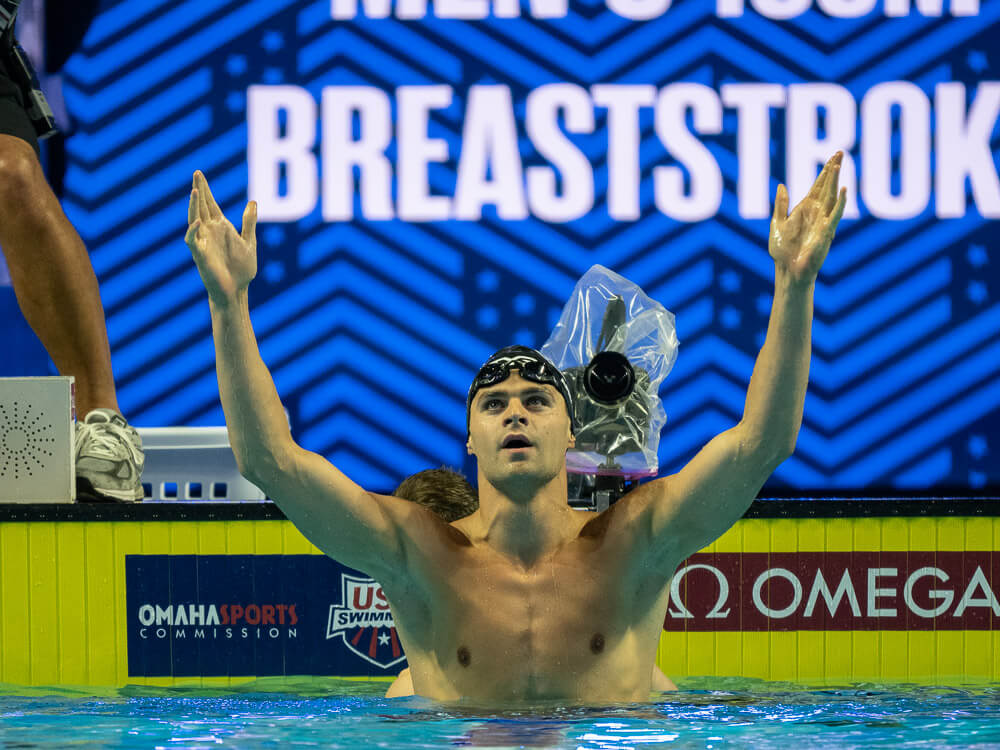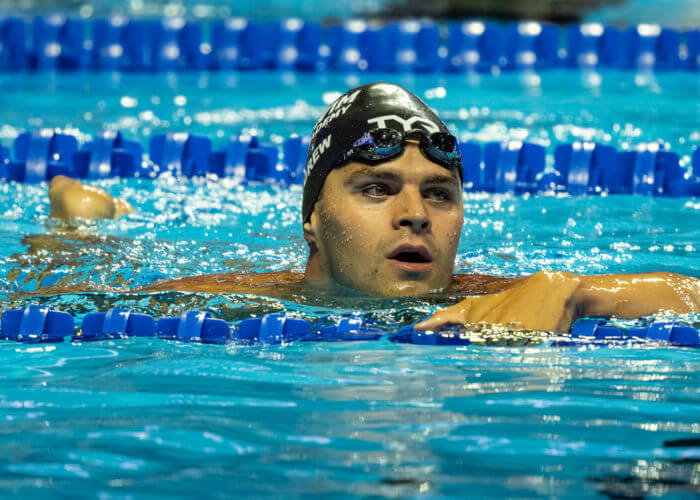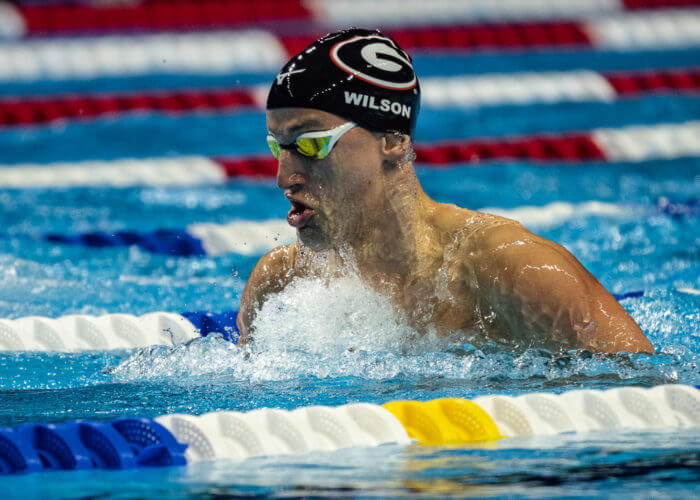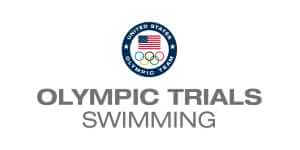Michael Andrew Lives Up to Age Group Hype With 100 Breaststroke Olympic Berth; Andrew Wilson Earns Second Spot

After a long, long wait, Michael Andrew can finally call himself an Olympic swimmer. And this isn’t in reference to the five years between Rio and now, but Andrew has had rising hype over his name since turning pro at age 14 in the summer of 2013. On Monday night, Andrew swam a 58.73 in the 100 breaststroke final, slower than his two American records yesterday, but enough to get him on the plane to Tokyo.
26-year-old Andrew Wilson, who couldn’t have had a different upbringing in the sport than Andrew, swimming at Division III Emory for college and not emerging as a contender for a national team spot until late 2015 at 22, finished in second at 58.74, just 0.01 behind Andrew.
Nic Fink, Wilson’s training partner at Georgia, finished in third at 58.80 in a heartbreakingly close finish as the top three had never swum in an Olympic Games before.
Many in the venue believed Andrew would be the first American swimmer to break 58 seconds and be just the third all-time to do so, after breaking the American record twice yesterday in heats and semi finals, moving himself up to third all-time. It seemed almost a foregone conclusion that he would break 58 and the race would be for second. But when Andrew was out a few tenths slower than yesterday at the 50 at 26.9, and Wilson and Fink were within striking distance, it looked to be anyone’s game.
As the trio came down on the third 25, they were stroke for stroke and with only two spots on the Olympic team, one of them had to be left out.
Andrew had tightened up considerably on the final 25 with both Wilson and Fink putting the pressure on. Under the flags, it looked like a repeat of the finals of both 400 IMs yesterday as it came down to a touch with Andrew winning, Wilson second, and Fink third. All three of them made the final in 2016, with Andrew in fourth, Wilson in fifth, and Fink in seventh.
“I had never felt as nauseous as I was,” Andrew said in his post race press conference. “I knew going into the semis I had to swim close to where I was in the morning with a little minor details and fix some things up, but I started to get out of my lane and was focusing on what Nic was doing next to me. I wanted to take those adjustments from semi finals into finals but I did even worse. I’m grateful for getting my hand on the wall first. It was a really holy spirit-guided swim in those last couple meters but there’s a lot we can work on and I’m excited for this next month as we get to Tokyo.”
The Age Group Phenom

Michael Andrew. Photo Courtesy: Peter H. Bick
Michael Andrew has long been one of the rising stars in the sport of swimming, turning heads at an early age way before he turned professional at age 14. His many national age group records as a 12-year-old saw him go viral on YouTube, catching the attention of swimming fans that wouldn’t normally pay attention to junior swimmers. His 50 free national age group record video at age 12 when he became the youngest boy to break 22 seconds in yards, has 69,000 views, and his name spread like wildfire.
His training style of ultra sprint race training, which consists of shorter workouts with only speed work and no weights or dryland training, has long been disputed as a non-effective training method. His decision also to not go to college and keep his dad Peter as his coach also caused criticism over the years.
But Andrew answered all those doubters when he looked into the camera at the Chi Health Center in Omaha, Nebraska and said “I’m Michael Andrew and I’m a Tokyo Olympian.”
“It’s still hard to believe it’s real,” Andrew said after racing the 100 back semi final later. “It’s been five years in the making and I remember the walk down the stairs was really hard as a 17 year old in 2016. To be able to come back and rectify that is a blessing and an honor.”
Andrew admitted the lead-up to Trials was a stressful one for his family and that swimming almost caused the family to split up.
“It took a lot of stepping back in understanding what’s the bigger picture?” Andrew said. “We came to our team was about to separate and a lot of it was because swimming was at our center and that was the focus all around. Now we are able to be here as a family and my sister is my biggest supporter and was crying the biggest crocodile tears. I love to see that because at a time I thought I was going to be here just me and my dad at Trials but we got our whole family back together and it is a very special thing so to be able to finish a race and run to them and give them love…I feel very blessed.”
Michael Andrew reflected on how he learned from dealing with criticism at a young age.
“We grow up in an age where social media and comment sections are a very toxic place and it is unfortunate because there is no face to that and people can say what they want without any consequences and the athletes are the ones that read it and it kind of sits in our heads and I have fallen culprit to that and I used to internalize what was said. In a way, it feels great and have vindicated myself like “yeah I stuck it to them!” But I realize it doesn’t change anything and it is really important to focus on the positive voices and those that are speaking life into you. I find it hard for people say that the way we train and the things we do don’t work because we have officially made it on the biggest stage.
“Initially in the beginning I felt like I would internalize it and use it as motivation and work harder to prove some random guy wrong. What happened is the more I focused on the negative the more it starts to show up in the light when you train and I had to stop doing that. It’s still very hard – I love to read comments but I realized there’s got to be a time where I completely switch it off. I do it with social media and I decided to shut myself off from it completely. I realize I just have to understand it is not healthy for me and the best way to go about it is to avoid it altogether.”
From Division III to Olympics

Andrew Wilson. Photo Courtesy: Peter H. Bick
Andrew Wilson had been a constant presence on the US national team for the last six years since breaking out as national champ in 2015, but Wilson was nowhere near a highly touted recruit of high school at Nation’s Capital Swim Club. As an 18-year-old in 2012, his 100 breast best time was a 1:08.97 before he went off to Emory that fall. While at Emory, he finished fourth in the 100 at Division III NCAAs in 2013, second in 2014. In 2015, he moved to train at the University of Texas, where he broke out as national champion the year prior to the Olympics. In 2018, he made his first national senior team for the Pan Pacs and reached the final of both the 100 and 200 breast at the 2019 Worlds. But his swim tonight, secured his place in history as the first Division III swimmer to make the US Olympic team.
“I’m so stoked right now,” Wilson said. “The experience last time in 16 just taught me so much and I knew that tonight was the swim that mattered. I know I wasn’t the fastest of the three in the last couple of days but I just got it done when it mattered.”
“I’m still processing it all. It doesn’t feel real yet. I just told myself that my plan is to be done at this level after this summer. I told myself to try and swim the best 100 breast of my career and if it was going to be the last one, it was going to be the last one. Now I have hopefully three more in Tokyo. I’ll celebrate it a little tonight by going to bed early because I have this 200 to prepare for.”
2016 Trials champ Kevin Cordes, who also trains in Georgia with Wilson and Fink, finished in fourth at 59.79, ahead of 2019 World Juniors 200 breast champ Josh Matheny (1:00.22) and Texas’ Will Licon (1:00.39).
NCAA champion Max McHugh finished tied for seventh with Loyola grad Ben Cono (1:00.56) as he had actually turned third at the halfway point at 27.64.
Results:
- Michael Andrew, 58.73
- Andrew Wilson, 58.74
- Nic Fink, 58.80
- Kevin Cordes, 59.79
- Josh Matheny, 1:00.22
- Will Licon, 1:00.39
- Max McHugh, 1:00.56
- Ben Cono, 1:00.56
2021 World Rankings (Tokyo Qualifiers)
- 57.39, Adam Peaty, GBR
- 57.90, Arno Kamminga, NED
- 58.14sf, Michael Andrew, USA
- 58.37, Nicolo Martinenghi, ITA
- 58.46, Ilya Shymanovich, BLR
- 58.58, James Wilby, GBR
- 58.74, Andrew Wilson, USA
- 58.95, Fabian Schwingenschlogl, GER
- 59.11, Kirill Prigoda, RUS
- 59.18, Shoma Sato, JPN
All-Time Rankings:
- 56.88, Adam Peaty, GBR, 2019
- 57.90, Arno Kamminga, NED, 2021
- 58.14, Michael Andrew, USA, 2021
- 58.29, Ilya Shymanovich, BLR, 2021
- 58.37, Nicolo Martinenghi, ITA, 2021
- 58.46, Cameron van der Burgh, RSA, 2012
- 58.46, James Wilby, GBR, 2019
- 58.50, Nic Fink, USA, 2021
- 58.58, Brenton Rickard, AUS, 2009
- 58.63, Yan Zibei, CHN, 2019


- 2016 USA TRIALS ARCHIVE
- ARCHIVES OF OLYMPIC TRIALS VIA SWIMMING WORLD VAULT
- 2021 USA OLYMPIC TRIALS WAVE I CUTS
- 2021 USA OLYMPIC TRIALS WAVE II CUTS
- HEAD USA OLYMPIC COACHES
- 2016 FULL RESULTS
- WAVE I FULL RESULTS
- PSYCH SHEET
- DAY ONE RESULTS
- DAY TWO RESULTS
- DAY THREE RESULTS
- DAY FOUR RESULTS
- DAY FIVE RESULTS
- DAY SIX RESULTS
- DAY SEVEN RESULTS
- DAY EIGHT RESULTS



